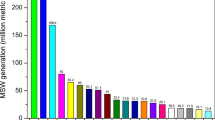Abstract
Municipal solid waste (MSW) management poses a significant environmental challenge in municipalities across developing nations worldwide. Our studies were focused on characterizing the waste and analyzing the chemical properties of mixed waste fractions to assess their potential for waste-to-energy conversion. The objective of our study was to scrutinize the existing state of the MSW management system and gauge its waste generation rates. Specific ASTM methods were employed to carry out both physical and chemical characterizations. The outcomes reveal that the city generates a daily volume of 1155 tons of domestic solid waste (DSW), translating to a generation rate of 0.51 kg−1 capita−1 day−1. When analyzed by source, organic matter emerged as the predominant constituent, accounting for 73.74% of the waste, followed by combustible content waste at 15.17%. The moisture content of MSW ranged between 26 and 58% throughout the seasons, while volatile solids varied from 22.35 to 99.74%. Among the components screened, carbon and oxygen stood out as the dominant elements. The calorific values encompassed a broad range, ranging from 14.87 MJ kg−1 for leather waste to a substantial 25,629.27 MJ kg−1 for organic waste. To alleviate the escalating burden of increasing solid waste generation, alternative treatment approaches were recommended. These include composting, biomethane plants, the establishment of recycling facilities, and the enhancement of existing landfill sites to scientifically designed landfills. In summary, the findings from this study provide valuable insights for regulatory bodies and municipal authorities. These insights can guide the formulation of policies concerning waste sampling, characterization, segregation, and the implementation of education and awareness campaigns.
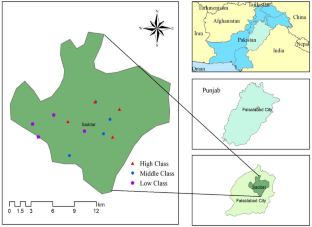
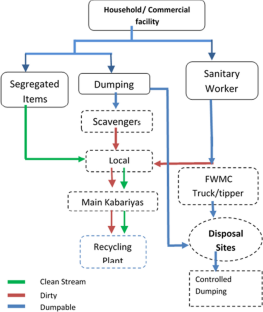
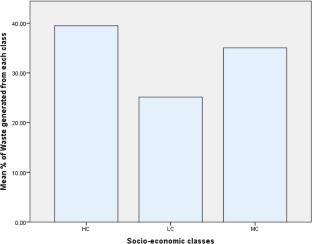
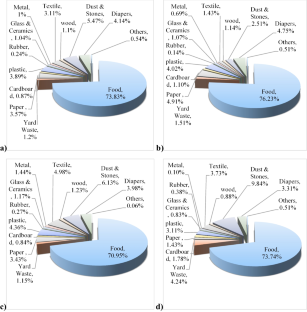
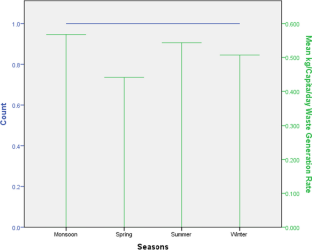
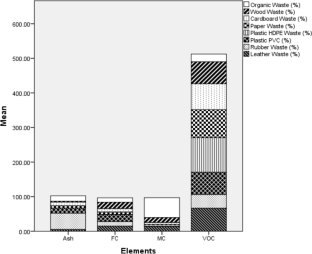
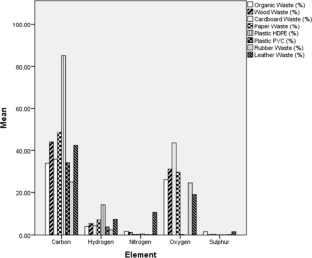
Similar content being viewed by others
Data availability
Entire data generated in this experiment has been included in this manuscript.
References
Abu Qdais HA (2007) Techno-economic assessment of municipal solid waste management in Jordan. Waste Manag 27(11):1666–1672
Akmal T, Jamil F (2021) Assessing health damages from improper disposal of solid waste in metropolitan Islamabad-Rawalpindi, Pakistan. Sustainability 13(5):2717
ASTM International (2004a) Test method for ash in the analysis sample of refuse derived fuel; ASTM-E830–87; ASTM International: West Conshohocken, PA, USA, 778–783
ASTM International (2004b) Test method for total moisture in a reused derived fuel laboratory sample; ASTM-E949–88; ASTM International: West Conshohocken, PA, USA, 839–842
ASTM (2019) Standard test method for volatile matter in the analysis of particulate wood fuels, E872–82. ed. West Conshohocken, PA, USA: American Society for Testing and Materials
Baawain M, Al-Mamun A, Omidvarborna H, Al-Amri W (2017) Ultimate composition analysis of municipal solid waste in Muscat. J Clean Prod 148:355–362
Batool SA, Chuadhry MN (2009) The impact of municipal solid waste treatment methods on greenhouse gas emissions in Lahore, Pakistan. Waste Manag 29(1):63–69
Bhat RA, Nazir R, Ashraf S (2014) Municipal solid waste generation rates and its management at Yusmarg forest ecosystem, a tourist resort in Kashmir. Waste Manag Res 32:165–169
Boumanchar I, Chhiti Y, Alaoui FEM, Sahibed-Dine A, Bentiss F, Jama C, Bensitel M (2018) Municipal solid waste higher heating value prediction from ultimate analysis using multiple regression and genetic programming techniques. Waste Manag Res 37:578–589
Buenrostro O, Bocco G, Bernache G (2001) Urban solid waste generation and disposal in Mexico: a case study. Waste Manag Res 19(2):169–176
Cheela VRS, Goel S, John M, Dubey B (2021) Characterization of municipal solid waste based on seasonal variations, source and socio-economic aspects. WDSE 3:275–288
Dangi MB, Pretz CR, Urynowicz MA, Gerow KG, Reddy JM (2011) Municipal solid waste generation in Kathmandu Nepal. J Environ Manag 92:240–249
Dlamini S, Simatele MD, Serge Kubanza N (2019) Municipal solid waste management in South Africa: from waste to energy recovery through waste-to-energy technologies in Johannesburg. Local Environ 24:249–257
Faisalabad Waste Management Company (FWMC) (2015). Action plan to expand solid waste management services to the entire city area
Ferronato N, Torretta V (2019) Waste mismanagement in developing countries: a review of global issues. Int J Environ Health Res 16:1060
Golhosseini Z, Jalili Ghazizadeh M (2021) Municipal solid waste status in Iran; from generation to disposal. Preprint available at Research Square 1–17.
Hussain F, Chaudhry MN, Batool SA (2014) Assessment of key parameters in municipal solid waste management: a prerequisite for sustainability. Int J Sustain Dev World Ecol 21(6):519–525
Ilyas H, Ilyas S, Ahmad S, Nawaz M (2017) Waste generation rate and composition analysis of solid waste in Gujranwala City Pakistan. Int J Waste Resour 7(297):2
Iqbal A, Abdullah Y, Nizami AS, Sultan IA, Sharif F (2022) Assessment of solid waste management system in pakistan and sustainable model from environmental and economic perspective. Sustainability 14(19):12680
Jabeen FM, Yamin M, Adrees M, Ibrahim M, Batool SA, Mahmood A, Khalid S (2021) Estimation of greenhouse gases emission from domestic solid waste of Faisalabad city and its proposed chemical formula. Pakistan J Agric Sci 58:69–79
Jabeen F, Adrees M, Ibrahim M, Mahmood A, Khalid S, Sipra HFK, Bokhari A, Mubashir M, Khoo KS, Show PL (2022) Trash to energy: a measure for the energy potential of combustible content of domestic solid waste generated from an industrialized city of Pakistan. J Taiwan Inst Chem Eng 137:104223
Jadoon A, Batool SA, Chaudhry MN (2014) Assessment of factors affecting household solid waste generation and its composition in Gulberg Town, Lahore, Pakistan. J Mater Cycles Waste Managt 16:73–81
Jerin DT, Sara HH, Radia MA, Hema PS, Hasan S, Urme SA, Audia C, Hasan MT, Quayyum Z (2022) An overview of progress towards implementation of solid waste management policies in Dhaka. Bangladesh Heliyon 8:08918
Joel W, Eckart R (1986) Modern power plant engineering, 2nd edition, Prentice- Hall International, New Delhi
Johari A, Hashim H, Mat R, Alias H, Hassim M, Rozzainee M (2012) Generalization, formulation and heat contents of simulated MSW with high moisture content. J Eng Sci Technol 7(6):701–710
Kabera T, Wilson DC, Nishimwe H (2019) Benchmarking performance of solid waste management and recycling systems in East Africa: comparing Kigali Rwanda with other major cities. Waste Manag Res 37:58–72
Kamran A, Chaudhry MN, Batool SA (2015) Effects of socio-economic status and seasonal variation on municipal solid waste composition: a baseline study for future planning and development. Environ Sci Eur 27:16
Kaza S, Yao L, Bhada-Tata P, Van Woerden F (2018) What a Waste 2.0: a global snapshot of solid waste management to 2050; The World Bank:1–296
Khan D, Kumar SR, Samadder (2016) Impact of socioeconomic status on municipal solid waste generation rate. Waste manag 49:15–25
Kumar S, Pandey A (2019) Current developments in biotechnology and bioengineering and waste treatment processes for energy generation: an introduction. In Current Developments in Biotechnology and Bioengineering; Elsevier: Amsterdam, The Netherlands:1–9
Lagerkvist A, Dahlen L (2019) Solid waste generation and characterization. In Recovery of materials and energy from urban wastes: a volume in the encyclopedia of sustainability science and technology, 2nd ed.; Springer: Cham, Switzerland:7–20
Lee C, Huffman G (2001) Solid waste calculations: thermodynamics used in environmental engineering. Handbook Incineration 2(2):47
Macrae G (2012) Solid waste management in tropical Asia: what can we learn from Bali? Waste Manag Res 30:72–79
Mahar A, Malik RN, Qadir A, Ahmed T, Khan Z, Khan MA (2019) Review and analysis of current solid waste management situation in urban areas of Pakistan. In Proceedings of the Inter-National Conference on Sustainable Solid Waste Management, Chennai, India, 10–11:34–41
Moftah WAS, Marković D, Moftah OAS, Naseef L (2016) Characterization of household solid waste and management in Tripoli City—Libya. Open J Ecol 6:435–442
Mushtaq J, Dar AQ, Ahsan N (2020) Physio-chemical characterization of municipal solid waste and its management in high-altitude urban areas of North-Western Himalayas. WDSE 2:151–160
Nabavi-Pelesaraei A, Bayat R, Hosseinzadeh-Bandbafha H, Afrasyabi H, Chau KW (2017) Modelling of energy consumption and environmental life cycle assessment for incineration and landfll systems of municipal solid waste management—a case study in Tehran Metropolis of Iran. J Clean Prod 148:427–440
Olley JE, Jgosse J, Rudin V, Alabaster G (2014) Developing a common framework for integrated solid waste management advances in Managua Nicaragua. Waste Manag Res 32:822–833
Page AL, Miller RH, Keeney DR (1982) Methods of soil analysis, handbook of chemical and microbiological properties –part 2 (second edition)
Pakistan Bureau of Statistics (2017) Provisional summary results of 6th population and housing census-2017
Pakistan Bureau of Statistics, Government of Pakistan. Available online: https://www.pbs.gov.pk/content/population-census. accessed on 1 September 2022
Permana AS, Towolioe S, Abd Aziz N, Ho CS (2015) Sustainable solid waste management practices and perceived cleanliness in a low-income city. Habitat Int 49:197–205
Pokhrel D, Viraraghavan T (2005) Municipal solid waste management in Nepal: practices and challenges. Waste Manage 25:555–562
Ramakrishna V, Subrahmanyam CN, Bhanuchand S (2016) Municipal solid waste quantification, characterization and management in Mylavaram. IOSR J Mech Civ Eng 13:77–87
Romano G, Rapposelli A, Marrucci L (2019) Improving waste production and recycling through zero-waste strategy and privatization: an empirical investigation. Resour Conserv Recycl 146:256–263
Semernya L, Ramola A, Alfthan B (2017) Waste management outlook for mountain regions: sources and solutions. https://wedocs.unep.org/handle/20.500.11822/16794. Accessed 28 Aug 2019
Serge Kubanza N, Simatele MD (2020) Sustainable solid waste management in developing countries: a study of institutional strengthening for solid waste management in Johannesburg, South Africa. J Environ Plan Manag 63:175–188
Sethi S, Kothiyal NC, Nema AK, Kaushik MK (2013) Characterization of municipal solid waste in Jalandhar City, Punjab, India. J Hazard Toxic Radioact Waste 17(2):97–106
Sohoo I, Ritzkowski M, Sohu ZA, Cinar SÖ, Chong ZK, Kuchta K (2021) Estimation of methane production and electrical energy generation from municipal solid waste disposal sites in Pakistan. Energies 14:2444
Soukiazis E, Proença S (2020) The determinants of waste generation and recycling performance across the Portuguese municipalities – a simultaneous equation approach. Waste Manage 114:321–330
Sukarni S (2016) Exploring the potential of municipal solid waste (MSW) as solid fuel for energy generation: case study in the Malang City, Indonesia. AIP Conference Proceedings. AIP Publishing LLC: 020003
Suthar S, Singh P (2015) Household solid waste generation and composition in different family size and socio-economic groups: a case study. Sustain Cities Soc 14:56–63
SWM Rules (2016) Municipal solid waste management manual-part II. Minist Urban Dev 3:604
Tabatabai MA (1974) Determination of sulphates in water samples. Sulphur Inst J 10:11–13
Zia A, Batool SA, Chauhdry MN, Munir S (2017) Influence of income level and seasons on quantity and composition of municipal solid waste: a case study of the capital city of Pakistan. Sustainability 9:1–13
Acknowledgements
The authors are thankful to Government College University Faisalabad Pakistan for all the support to coduct this experimental work.
Funding
This research was partially funded by the Higher Education Commission of Pakistan via project number HEC-NRPU 5635. The authors are grateful to HEC for this research funding.
Author information
Authors and Affiliations
Contributions
FJ: conceptualization, data curation, investigation, writing — original draft; MA: visualization, methodology, data curation, writing — review and editing; MI: conceptualization, methodology, validation, writing — review and editing; MW: project administration, writing — review and editing; AM: visualization, methodology, writing — review and editing, funding acquisition; UZ; writing — review and editing; AS: methodology, validation, editing.
Corresponding author
Ethics declarations
Ethical approval
Not applicable. No experimental animals or human being are used in current research for whom national or international guidelines are used for the protection of animals welfare and human subjects.
Consent to participate
We confirm that manuscript has been read and approved by all authors named in contribution section, and there are no other person who satisfied the criteria for authorship but not listed. We further approved that all the authors listed in the manuscript have been approved by all of us.
Consent for publication
We confirm that manuscript has been read and approved by all authors named in contribution section, and there are no other person who satisfied the criteria for authorship but not listed. We further approved that all the authors listed in the manuscript have been approved, and we show our consent to publish this manuscript.
Conflict of interest
The authors declare no competing interests.
Additional information
Responsible Editor: Philippe Garrigues
Publisher's Note
Springer Nature remains neutral with regard to jurisdictional claims in published maps and institutional affiliations.
Rights and permissions
Springer Nature or its licensor (e.g. a society or other partner) holds exclusive rights to this article under a publishing agreement with the author(s) or other rightsholder(s); author self-archiving of the accepted manuscript version of this article is solely governed by the terms of such publishing agreement and applicable law.
About this article
Cite this article
Jabeen, F., Adrees, M., Ibrahim, M. et al. Characterization for optimizing the integrated management of solid waste for energy recovery and circular economy. Environ Sci Pollut Res (2023). https://doi.org/10.1007/s11356-023-30980-0
Received:
Accepted:
Published:
DOI: https://doi.org/10.1007/s11356-023-30980-0




